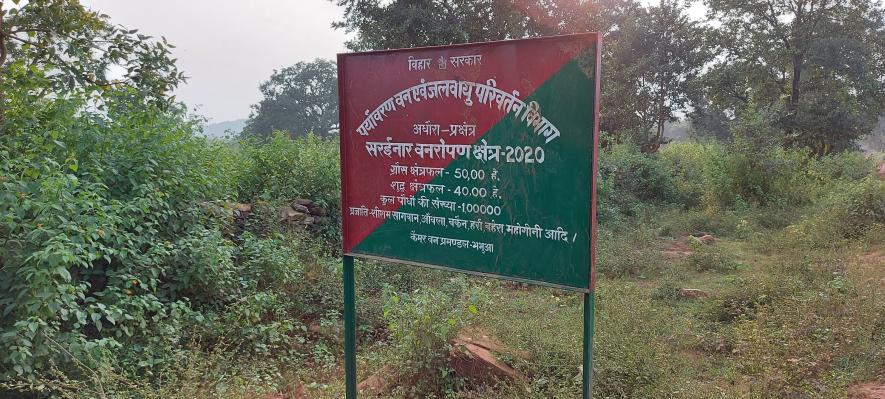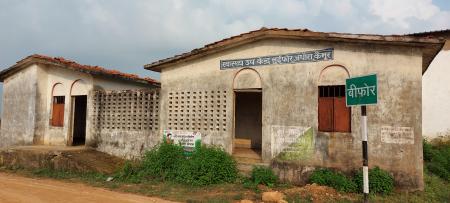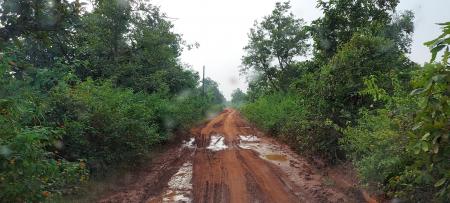Bihar Elections: Kaimur Tribals to Boycott Polls in Protest Against Proposed Tiger Reserve

Bhabhua, Kaimur (Bihar): As many as 108 tribal villages of the Kamir plateau are set to boycott the upcoming Assembly elections in the state as a mark of their anger against a proposed tiger reserve in the Kaimur Wildlife Sanctuary. The villagers, who said they have been dwelling in the local forests for generations since 1911, fear displacement of around one lakh indigenous people.
The hilly region of Kaimur district comes under Chainpur Assembly constituency, which is a present represented by Brij Kishor Bind of Bharatiya Janata Party (BJP). Bind is cabinet minister for backward classes welfare in the Bihar government, led by Nitish Kumar.
The boycott call may impact the electoral results in two districts — Kaimur and Rohtas -- which are going to polls in the first phase (October 28) of the three-phase elections to the 243-seat Bihar Legislative Assembly.
The plateau, which is also known as Rohtas Plateau, has a total 131 villages comprising forest dwellers spread over Kaimur and Rohtas districts in South Bihar. The dense forests of Kaimur are surrounded by forests areas of three states — Madhya Pradesh, Uttar Pradesh and Jharkhand.
The forest dwellers of the area dub the proposed tiger reserve as an “attempt to grab forest land”.
“Despite spending most of the time in these dense forests every day for years, none of us have ever sighted or confronted a tiger here. The proposal to declare the sanctuary as a tiger reserve is nothing but an attempt to grab our land and evict us from here,” Raja Lal Singh Kharwar, working secretary of the Kaimur Mukti Morcha, an organisation of tribals belonging to the Kaimur hill region fighting for indigenous community rights, told NewsClick.
Inversely, he claimed that that wildlife had migrated from the forests because of deforestation. “The government, which is trying to evict us in the name of tiger reserve, must take responsibility of the reduced forest cover,” he said.
“Even if there were traces of tiger presence in this forest, we are not afraid of it, as we have historically co-existed with wildlife. We won’t allow anyone to displace us. It is a do-or-die situation for us,” he said.
Kharwar said the vulnerable tribal communities were left with no option but to boycott the polls, as the authorities, instead of listening to them, used force when they staged a sit-in at Audhra block on September 10-11 this year to demand legal rights over water, forest and land.
“Since public representatives have always failed us, what’s the point in taking part in the electoral process. We decided to boycott the polls after we witnessed police brutalities. We had democratically organised a sit-in and had urged authorities to come and talk to us. When nobody came to listen to our demands, we locked the gates of the block and forest department to make our voices heard. But, instead of engaging in a dialogue with the peaceful protestors, the police opened fire and showered lathis on us,” he said
Kharwar said the “brutal police action infuriated the protesters who also fought back. The peaceful protest turned violent and our three activists suffered bullet injuries and several faced arrests. The police also broke locks of Kaimur Mukti Morcha office and conducted raids there. It has now become a routine affair that our activists are arrested and branded as Maoists. They are either booked under UAPA or killed in fake encounters,” adding that they will continue their fight using all democratic means.
Kharwar, along with six other people, has been booked under various sections of the Indian Penal Code and under Section 27 of The Arms Act, 1959 for unlawful gathering, among others.
Several activists alleged that forest department officials had been “encroaching upon agricultural lands of adivasis since March with the intention of evicting them from villages of Adhaura block, such as Gullu, Guiyan, Dighar, Bahabar, Pipra, Sainagar, Sodha, Bahera, Dumrava, Sarainar.
Villagers and forest rights activists are demanding a complete rollback of the proposed tiger reserve, administrative reorganisation of the Kaimur hills and inclusion of the same under Schedule V, implementation of the Chotanagpur Tenancy Act and the PESA Act in the region, roll-back of the draft Indian Forest (Amendment) Bill of 2019 and immediate implementation of the Forest Rights Act, 2006.
“This is a tribal concentrated area. But the government has divided the entire area into eight blocks in two districts to ensure non-inclusion of the region in Schedule V. We demand an administrative reorganisation of the hills and creation of two blocks only for the tribal population so that our area can be included in Schedule V,” Kharwar added.
‘ATTEMPT TO GRAB FOREST LAND’
The president of the Morcha, Bal Kishwar Singh Kharwar, claimed that people in Ruiya village in Adhaura block had already been forcibly displaced by the forest department and police during the lockdown.
In Sarainar, he alleged, the forest department officials destroyed all 50 houses. “Government officials have been pressuring the villagers in Gullu by digging pits on their farm lands under the garb of carrying out afforestation,” he alleged.
“It is a gross violation of the Forest Rights Act 2006, which recognises and vests forest rights on Scheduled Tribes (STs) and other traditional forest dwellers,” he alleged.
Section 4(1) of the Act categorically mentions that no member of a forest dwelling Scheduled Tribe or other traditional forest dwellers shall be evicted or removed from forest land under his occupation. According to the Act, even a plantation drive in the forest requires approval from the Gram Sabha.
“But these rules have been violated in the Adhaura block,” alleged the activists.
In fact, the provisions of Panchayat (extension) in the Scheduled Area Act (PESA) 1996 also recognise the self-determination of adivasis and empower the Gram Sabha to manage natural resources.
This is also a violation of the Supreme Court judgment in the case of Odisha Mining Corporation Vs Ministry of Forest and Environment and others (c) No. 180 of 2011, which clearly states that the Gram Sabha is the owner of the natural resources; therefore, the common land, sacred groves and forest and forest land of the villages cannot be acquired without the consent of the Gram Sabhas, the activists alleged.
“We have already lost a huge portion of land in the Durgawati and Haraiya dams. When these two dams were constructed, the forest department was given around 5,000 hectares in this forest. It severely impacted our dwellings,” the Morcha president said.
Locals alleged that some government officials had made earning a livelihood a struggle for adivasis. They said they were being harassed and arrested when they plucked tendu leaves (used in bidi-making) and other medicinal plants from the forest for selling them for survival.
“We have four acres among four brothers. We solely survive on agriculture for four months in which we grow paddy and wheat. The rest of the year, we depend on the forest for our livelihood. We collect tendu patta, anwala, mahna, chiraunji, bahera, lassa, etc and sell these to earn money. After the tiger reserve was proposed, collecting and selling these leaves, fruits, herbs and shrubs have become illegal. When we secretly sell it in the market, we get much lower prices, as local buyers argue that they have to bribe forest officials,” said Ram Lal Singh Kharwar, a resident of Goiyan village in Adhaura Tehsil of Kaimur district.

Another resident of the village, refusing to be named, said the government was least bothered about developing the area and creating employment opportunities for us.
“These hills have primary and secondary schools from students belonging to the ST community. But a few primary schools have not opened for years. No teacher comes in the schools, which are functional. They bribe the block pramukh, who clears their bills for transfer of salaries,” he alleged. He also claimed that the secondary school did not have teachers as per sanctioned strength.
“We don’t have roads in our villages. Earlier, the government used to give an excuse that Maoists did not let construction work to go on. But there is no insurgency since 2012, so why don’t we have any roads today? We had one primary health centre, which has now been converted into a Central Reserve Police Force camp. Now, we don’t have any hospital. If someone falls ill, he or she has to depend either on naturopathy or quacks,” the villager complained.
In July, too, the Kaimur Mukti Morcha had gathered around the office of the Block Development Officer to get their demands heard. This gathering saw thousands of villagers from various villages in Adhaura block expressing their anguish over the “persistent nuisance” caused by forest officials “obstructing their daily lives and means of livelihood and making life more difficult for them during the lockdown.”
Some forest department officials confirmed that tribals had been evicted. “Following a Patna High Court order, some encroachments have been freed because people were illegally cultivating on government land inside the sanctuary,” they old NewsClick.
When asked about the specific allegation of harassment, the officials denied it. “Cultivation and doing business activities using the sanctuary’s forest produces are illegal. Those who are found indulging in these acts are dealt in accordance with the law,” one of them said.
THE PROPOSED TIGER RESERVE
Of the total 1,134 square kilometres of the Kaimur forests, the Bihar government has approved around 90% of the sanctuary for another tiger reserve in the state as the Valmiki Tiger Reserve (VTR) is nearing saturation, with 41 big cats living in 900 sqaure km. Apart from tigers, VTR also accommodates leopards, jackals, bears, dogs, foxes and wild dogs.
The latest tiger sighting in Kaimur forests was reported in March this year. The proposal to develop the Kaimur Wildlife Sanctuary as a tiger reserve first came after a big cat was spotted in its forests in 1995. The proposal gained momentum after the then Kaimur Divisional Forest Officer (DFO) Satyajeet Kumar in 2017 said he sighted pug marks of two tigers and also the carcasses of animals they had preyed on.

In 2018, Kumar sent a proposal to the Bihar government for another tiger reserve following which officials from the Environment, Forest and Climate Change departments conducted an inspection in October 2018 to find out if conditions were favourable for tigers.
If the National Tiger Conservation Authority approves the Bihar government’s proposal, a team of experts will make another ground visit, following which the Union Environment Ministry will declare it as a tiger reserve if it meets the conditions.
Rajiv Pratap Rudy, BJP Member of Parliament from Saran, in September this year, too, proposed in Lok Sabha during the Monsoon Session of Parliament that the Kaimur Wildlife Sanctuary should either be developed as a national park or tiger reserve.
Locals and activists fear that the proposed tiger reserve will go the way of Betla Tiger Reserve in Jharkhand’s Palamu. “All the villages that fell under the reserve area were displaced and it was declared an uninhabited area,” claimed Raja Lal Singh.
MISPLACED FEAR?
Kaimur DFO Vikash Ahlawat claimed there would be no displacement even if the sanctuary was declared a tiger reserve. “I assure everyone that no displacement will take place. I urge people not lend ears to rumour mongering. Tiger reserves are notified under the Wildlife Protection Act and the Indian Forests Act for getting more funds from the Centre for development of the area. It has nothing to do with the people residing in the area,” he said.
Established by Dr Binian four decades ago Kaimur Mukti Morcha claims to have been fighting for tribal rights and secure jal, jungle, zameen (water, forest and land). The contribution of the movement has been acknowledged by the state government in the past.
Though the Kaimur area was notorious for its Maoist presence in the past, it became free of Maoists after Kaimur Mukti Morcha, which is said to have advocated democratic means such as peaceful dialogue to fight for their rights, came into existence.
POLITICAL EQUATION
The BJP won the Chainpur Assembly constituency in five of the total 15 elections held here since its formation in 1951. While the seat went to Congress thrice till 1967, the Bahujan Samaj Party (BSP) and the Rashtriya Janata Dal (RJD) bagged it twice in 1995 and 2000 elections and 2005 and 2010, respectively. The Praja Socialist Party won once in 1969.
First the Bharatiya Jana Sangh and Janata Party and then the BJP grabbed the seat in 1972, 1977, 1980, 1990, 2009, 2010 and 2015 elections.
In the last Assembly elections, BSP candidate Mohammad Jama Khan was defeated by BJP by just 671 votes. In the upcoming polls, this seat is set to witness a triangular fight among Congress, BSP and BJP.
Get the latest reports & analysis with people's perspective on Protests, movements & deep analytical videos, discussions of the current affairs in your Telegram app. Subscribe to NewsClick's Telegram channel & get Real-Time updates on stories, as they get published on our website.
























